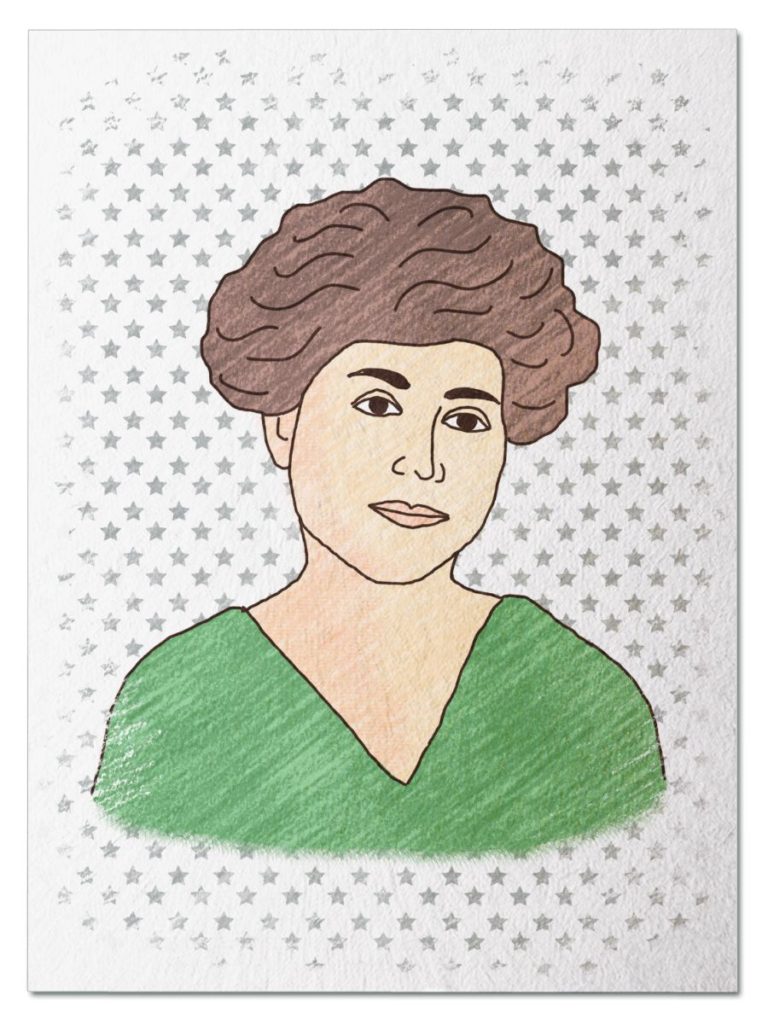
Inspiring Inventor
She invented one of the most popular games in history by combining her passion for education and economic theory with a sense of fun and competition. Her game has been played worldwide for almost a century yet the man who claimed credit is the one who became a millionaire. Pull up a front row seat to her 1936 newspaper interview where she set the record straight and meet Lizzie Magie Phillips…
Her Ruby Shoe Moment
The Power of the Wand
Her Yellow Brick Road
Brains, Heart & Courage
Glinda’s Gallery
Just the Facts
Her Ruby Shoe Moment
Lizzie Magee Phillips paced around her home on a winter’s day in January 1936, waiting for the reporters she had phoned to arrive. There were three board games sitting on her kitchen table. Two were versions of a game Lizzie invented, called The Landlord’s Game. The other was a brand new game just released by a company named Parker Brothers. All the marketing for this new game, called Monopoly, credited its invention to an unemployed man named Charles Darrow, who supposedly came up with the idea while searching for a way to support his family. It was the middle of the Great Depression, and Charles’ rags to riches story had enormous appeal.
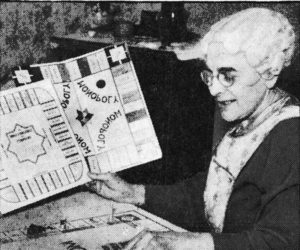
Lizzie comparing Monopoly and The Landlord’s Game (Wikimedia Commons).
When the reporters arrived, Lizzie revealed the real inventor of Monopoly…Lizzie! When she showed the reporters her original game boards from The Landlord’s Game, they agreed that when put side by side with the new Monopoly board, the similarities were obvious. Lizzie showed them her first patent for The Landlord’s Game, dated January 5, 1904 – 32 years earlier!
The reporters, now intrigued, asked Lizzie how she got the idea for a game. She told them about her quest to bring attention to growing income and power inequalities. At the turn of the century, the American economy had become dominated by a few wealthy families who owned most of the land and natural resources. Lizzie wanted to educate people about the dangers to society from monopolies, but knew that the lesson would be better learned if it was fun.
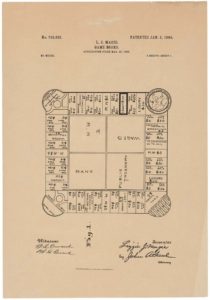
Lizzie’s 1904 patent for The Landlord’s Game (National Archives).
Lizzie reminded the reporters that board games were an exciting new idea in the early 1900s, so she set to work incorporating her monopoly lesson into an interactive game where the winner prevails by bankrupting everyone else. Players compete to create monopolies in land and railroads. The more they own, the higher the rent and ticket prices they can charge. There are regular fees for utilities, and the powerful can send you to jail or the poorhouse.
The reporters asked Lizzie why she didn’t sell the game herself after getting her patent. Her response: I tried! She and some friends started a game company, but they didn’t have the resources for mass production. But the few official sets in circulation started a phenomenon, as people played it with friends, enjoyed it, and then made their own copy of the game.
When she was asked how Parker Brothers ended up with her game, Lizzie relived how they sent a representative to her home one day out of the blue. The rep told Lizzie that Parker Brothers loved The Landlord’s Game and offered her $500 on the spot for her patents. He promised that it would be widely published, and also committed to produce an anti-monopolist version. Since Lizzie’s main purpose for inventing the game was to spread the word about the dangers of monopolies, she happily sold the patents.
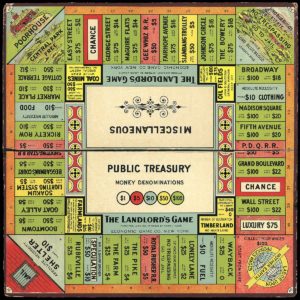
The Landlord’s Game circa 1906 (Wikimedia Commons courtesy of T. Forsyth & LandlordsGame.Info).
What Lizzie didn’t know was that Parker Brothers had already bought a version of her game from Charles Darrow. Charles had discovered it at a friend’s house a few years earlier and enjoyed it so much his friend made him a copy. Charles then decided to sell the game as his own, and without explaining why, asked his friend for a written copy of the rules. After the sale, Parker Brothers realized Monopoly was a version of The Landlord’s Game and became concerned Lizzie could challenge its right to the game. That’s when the representative appeared at her door.
Lizzie shook her head with regret as she told the reporters how delighted she had been when Parker Brothers sent her a prototype of The Landlord’s Game. Her delight turned to confusion when only a few copies were made. And her confusion turned to anger when she realized Parker Brothers mass produced Monopoly and gave Charles Darrow credit for inventing it, with no mention of Lizzie at all!
 As the reporters left amidst promises to tell Lizzie’s story, she assumed that she would be completely vindicated. Again, she was disappointed. The articles acknowledged Lizzie’s involvement, but minimized her role. One article said that Charles “retrieved the game from the oblivion of the Patent Office and dressed it up a bit, to get it going” and Parker Brothers took over his improvements.
As the reporters left amidst promises to tell Lizzie’s story, she assumed that she would be completely vindicated. Again, she was disappointed. The articles acknowledged Lizzie’s involvement, but minimized her role. One article said that Charles “retrieved the game from the oblivion of the Patent Office and dressed it up a bit, to get it going” and Parker Brothers took over his improvements.
However, Lizzie’s efforts did succeed in getting Parker Brothers to credit her as a Monopoly “co-inventor” during her lifetime, but she was written out of the story after her death. Charles Darrow, meanwhile, became a millionaire, as Monopoly sold 278,000 copies in its first year and more than 1,750,000 copies in year 2. Whenever he was asked how he came up with the idea, he would answer with “it’s a freak.”
The Power of the Wand
People of Play Week (formerly the Chicago Toy & Game Fair) hosts an annual Young Inventors Challenge every fall for kids age 6-18 to present their original ideas to major toy and game companies. Many of the winners end up getting their games licensed and sold in stores. In 2016, 10 year old friends Olivia Wasilewski and Brynna Siewers won the challenge for their game “Ship of Treasures.” They spent the next year working with game experts from Pressman Toys and Target to get the game ready for the public. Target started selling their game in October 2017.
Her Yellow Brick Road
Lizzie was working as a stenographer in Washington, D.C. when she decided to take a second job teaching political science classes in the evenings. She wanted to share the teachings of progressive economist Henry George. Henry believed that “what Mother Earth created, everyone owned,” meaning landowners should pay high taxes. He also believed that “what people created, they owned,” meaning people should not be taxed on their labor or consumer goods.
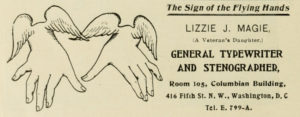
Lizzie’s business card (Wikimedia Commons).
Lizzie worried about the damage greedy landowners did to society. As the economy shifted from farming to industry, those who owned land, railroads, steel and oil became more powerful. Lack of competition meant regular people had to pay higher prices for rent and utilities. Lizzie also started spending a lot of time in Arden, Delaware, which was a “single tax enclave” where Henry George’s philosophy was put into practice.
Even with her own enthusiasm and her real life examples from Arden, Lizzie struggled with communicating Henry’s abstract ideas in a persuasive way. After too many classes with glassy eyed students, she started looking for a fun way to share her progressive message. Although she spent her free time writing and acting in plays, she didn’t think theater or stories would have the impact she sought. Board games had become a fad, so she decided to give designing one a try.
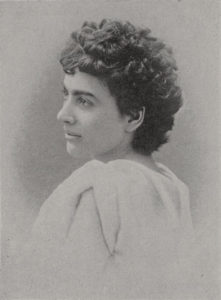
Lizzie’s author portrait from a poetry volume she wrote (Wikicommons Media).
Lizzie centered her game around players competing to buy and sell properties with play money and deeds. She rejected the typical game board design, where players raced from start to finish along a one way path. Instead, inspired by the Downtown Square in her hometown of Macomb, she decided to have players move game pieces around a square with no finish line, travelling continuously around the board. Each side of the square had nine spaces, with each one representing a property, railroad, “Absolute Necessity” (food and shelter), or “Franchise” (utilities).
Henry George occupied one corner with Mother Earth on the opposite. As players passed Mother Earth they received $100 salary. The Poor House and the Jail were on the other corners. Lizzie knew the competition would engage people, observing that “the rallying and chaffing of the others when one player finds himself an inmate of the jail, and the expressions of mock sympathy and condolence when one is obliged to betake himself to the poor house, make a large part of the fun and merriment of the game.”
Lizzie’s friends helped her test different designs to figure out the right combination of fun, ease of play, and education. She got her patent for in 1904 and founded the Economic Game Company with some friends a few years later. They successfully marketed Lizzie’s game to college communities. Professors used it in economics class. Students started playing it for fun in their free time and then bringing it home to family and friends.
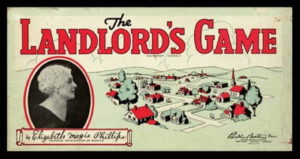
Parker Brothers’ short lived version of The Landlord’s Game (From the collection of Philip E. Orbanes).
Even with its growing popularity, game sales didn’t increase because its fans didn’t want to support capitalism by purchasing it. Instead, they made their own game boards on a piece of cloth, often personalizing property names and modifying rules. When it reached the Quakers of Atlantic City, NJ, they too personalized it, using local names like Baltic Avenue, St. Charles Place and The Boardwalk. Their version stuck, and is still used for classic Monopoly today.
Lizzie enjoyed hearing that people were making the game their own, because it meant more people were exposed to Henry George’s ideas. She patented a new edition of The Landlord’s Game in 1924. The new version had a revamped game board and two sets of rules: one for the original monopolist version and the other for an anti-monopolist version she called Prosperity. While this game was published in 1932 by a small gaming outfit called The Adgame Company, it didn’t have a wide enough reach for mass production.
Brains, Heart & Courage
Lizzie grew up in Macomb, Illinois. She loved spending time with her dad, who told her the stories of his pre-Civil War experiences as an abolitionist and newspaper publisher who traveled around the state with Abraham Lincoln during the Lincoln/Douglas debates.
 Her dad became the Postmaster after the war. He read a lot of books about progressive economics and politics, and one of his favorite authors was an economist named Henry George. Lizzie’s dad encouraged her to read Henry George’s books and she became a believer, especially after reading Progress and Poverty.
Her dad became the Postmaster after the war. He read a lot of books about progressive economics and politics, and one of his favorite authors was an economist named Henry George. Lizzie’s dad encouraged her to read Henry George’s books and she became a believer, especially after reading Progress and Poverty.
Lizzie’s parents encouraged her to be an independent woman. Instead of marrying young, she trained to be a typist and stenographer and got a job in the Dead Letter Office in Washington, D.C., saving enough money to buy her own home. Lizzie invented a paper feeder for her typewriter that fit all different size papers and gave her more room to type, leading to her first patent in 1893.
Glinda’s Gallery
Just the Facts
- Lizzie was born in Macomb, Illinois on May 9th, 1866. Lizzie Magie Day is celebrated in Macomb every year on her birthday.
- Parker Brothers put Lizzie’s face on the cover of the few copies of The Landlord’s Game it made.
- Parker Brothers bought two more of Lizzie’s games, King’s Men and Bargain Day, on the day it bought the patents. They published each but didn’t support them and they faded away without much attention.
- In the 1940 Census, Lizzie listed her occupation as a “maker of games” who earned $0 in income.
- Monopoly was used to smuggle maps and money to POWs in World War II.
- Lizzie spent the last years of her life working at the United States Office of Education as a typist.
- Lizzie died in 1948. Her husband Albert died before her and she had no children. Her obituary did not mention any of the games she invented.
- In 1973, a San Francisco State professor named Ralph Anspach made an anti-Monopoly game and Parker Brothers sued him for patent infringement. Ralph researched the origins of Monopoly to defend himself and discovered that it was actually Lizzie’s game. Ralph eventually won the 10 year court battle.
- Monopoly has sold over 250 million copies worldwide, is played in 114 countries, and made in 47 different languages.
- There are professional Monopoly players who compete in tournaments around the world.
- Hasbro bought Parker Brothers and now owns Monopoly. Until recently, Hasbro made no mention of Lizzie, starting its history with Charles Darrow in 1935. Now, the company admits Lizzie “inspired” the game.
- Click here to see pictures of what the Atlantic City properties that have been on the Monopoly Board since the 1930s look like today.
Want to Know More?
Pilon, Mary. The Monopolists: Obsession, Fury, and the Scandal Behind the World’s Favorite Board Game (Bloomsbury 2015).
Brown, David W. “Elizabeth ‘Lizzie’ Magie, Inventor of Monopoly” (Mental Floss Feb. 6, 2013).
CBS News. “The Scandalous History of Monopoly” (Mar. 21, 2015).
Dodson, Edward J. “How Henry George’s Principles Were Corrupted Into the Game Called Monopoly” (December 2011).
Forsyth, Thomas. Monopoly Game History, Landlord’s Game History (Landlordsgame.info).
Pilon, Mary. “The Secret History of Monopoly: The Capitalist Board Game’s Left Wing Origins” (The Guardian Apr. 11, 2015).
Pilon, Mary. “Monopoly Was Designed To Teach The 99% About Income Inequality” (Smithsonian Magazine Jan. 2015).
Pilon, Mary. “Monopoly’s Inventor: The Progressive Who Didn’t Pass ‘Go’” (New York Times Feb. 13, 2015).
Volpe, Francesca. “If Hasbro Wants To Promote Female Empowerment With Ms. Monopoly, They Should Look At The Game’s Origins” (Bust Sept. 13, 2019).
